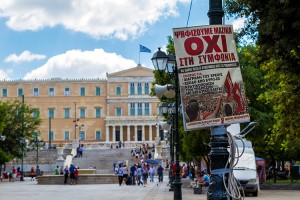Greece Votes Oxi!
July 6, 2015
In a surprising turn of events in the Greek debt crisis, Greek citizens on Sunday, July 5, overwhelmingly voted “no.” (Oxi, pronounced OH hee, is the Greek word for no.) Experts expected the vote to be close; it was not. Some 60 percent of the voters chose, well, it’s not certain what “no” meant. The exact policy to which they voted “no” is not clear to anyone. Last Friday, after fruitless negotiations with European Union (EU) officials on remedies to the Greek crisis, Greek Prime Minister Alex Tsipras pulled out of the negotiations. Tsipras’s position is that the austerity measures the EU required for another loan to the Greek government are actually causing Greece to lose ground on paying off its debt. Because the Greek economy shrank by 25 percent over the last five years of ongoing financing and demands for fiscal cuts by the European Central Bank and the International Monetary Fund, Greece actually owes a larger ratio of debt to its gross domestic product (GDP) than it initially did. (In 2010, the ratio of Greek debt to GDP was around 150 percent. In 2014, that figure had risen to around 175 percent.) The amount of debt Greece owes is thought by Tsipras and his Syriza government to be unsustainable (meaning it could never realistically be paid back). Greek government representatives want the amount of debt owed to be reduced. Other nations in the EU, however, feel they are using money from their taxpayers to finance Greek extravagance.
Tsipras called for the Greek people to vote on the terms of the EU’s bailout offer. Before the people of Greece could vote, however, the creditors took the bailout off the table. The Greek referendum went ahead anyway, with Tsipras saying that a vote of “no” would strengthen his hand in future negotiating.
During the week before the referendum, Greek banks were closed (later in the week reopening only for pensioners), and Greek citizens (except for pensioners) were under currency restrictions that allowed only 60 euros (about $67) per day to be withdrawn per person. Experts predict Greece will run out of currency sometime this week. In addition, campaign advertisements from the “yes” side, said to have been placed by Greek oligarchs, painted a bleak, and even frightening vision of what was in store for the Greek people if they voted “no,” threatening them with a country without gasoline and medicine. Some experts on Greece felt the pressure to vote “yes” may have backfired, angering the Greek people instead of encouraging them in a “yes” vote.

Pensioners congregate outside a National Bank branch ATM in Thessaloniki on July 1. Greek banks re-opened for pensioners only on July 1, allowing them to cash up to 120 euros. Credit: © Ververidis Vasilis, Shutterstock
Greece has a habit of saying “no!” On October 28 of each year, Greece celebrates a national holiday, Oxi Day, commemorating that date in 1940. During World War II (1939-1945), Italian fascist Benito Mussolini requested that his troops be allowed to enter Greece to occupy it, promising there would be no killing of Greek citizens. Greek dictator Joannes Metaxas replied, “oxi.” Greece suffered a hard war during World War II, occupied by Germany, Italy, and Bulgaria until 1944.
After this most recent no in 2015, several European leaders have called for an immediate resumption of talks with Greek officials in an attempt to work out the financial problems and keep Greece in the eurozone, or at least in the EU.
Other World Book articles:
- Greece (1940-a Back in time article)
- Greek Debt Crisis Becomes More Acute (Behind the headlines, February 29, 2015)
- Greece Closes Banks, as Debt Crisis Escalates (Behind the headlines, June 29, 2015)



